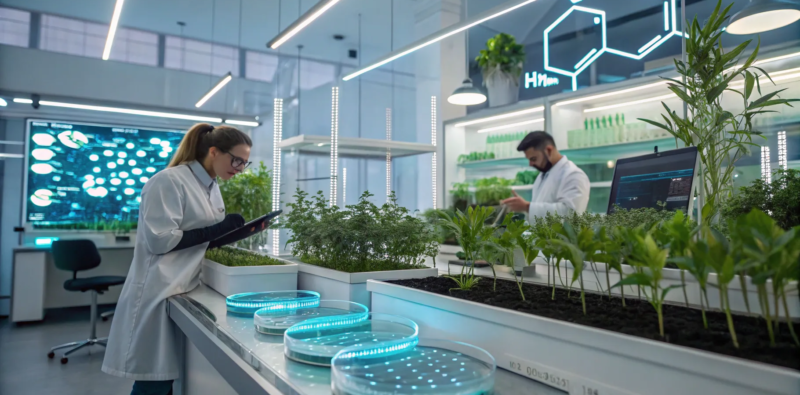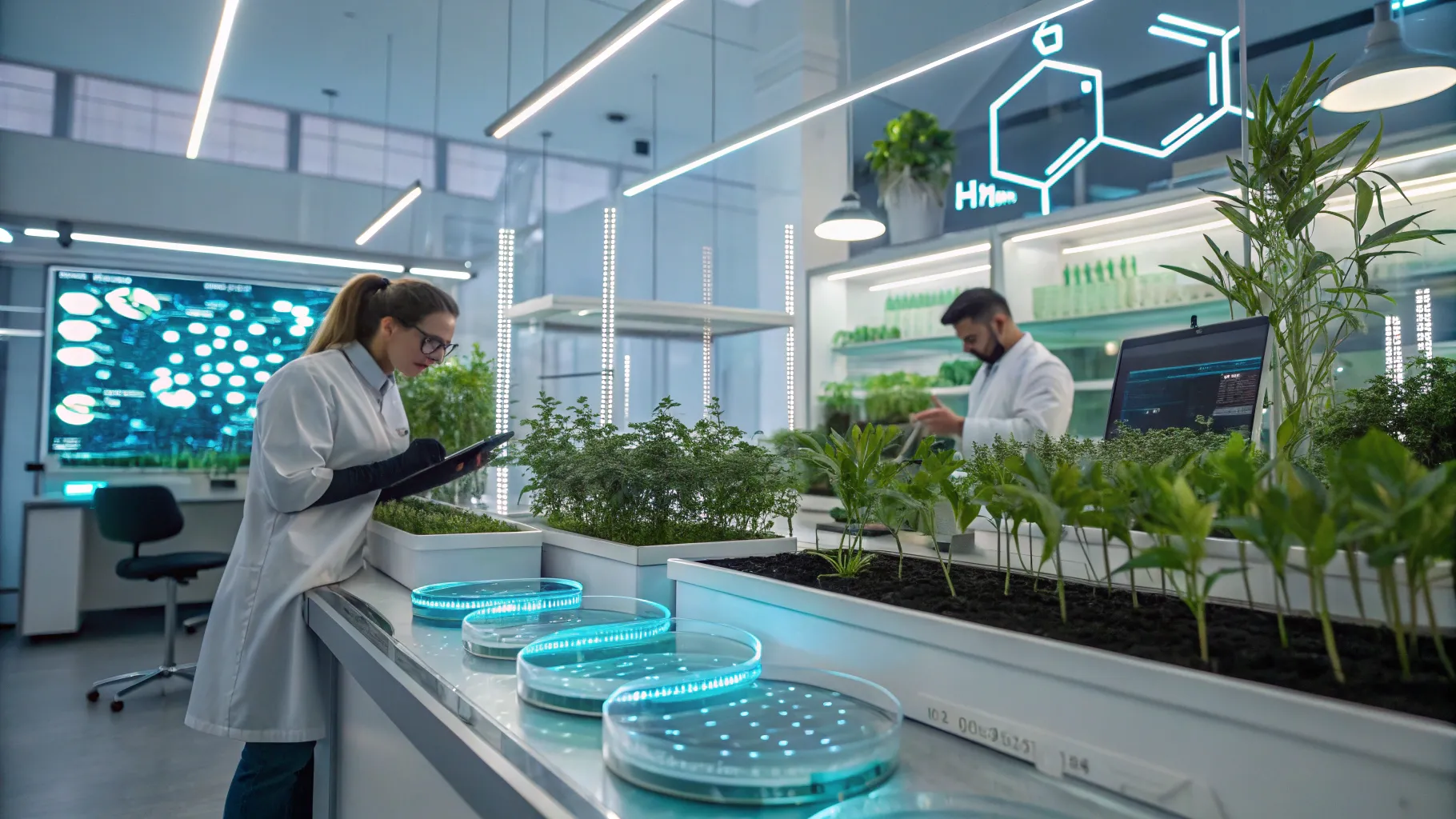
The Future of Biotechnology: Opportunities and Innovations

Biotechnology is rapidly evolving, offering vast career opportunities and solutions to some of the world’s most pressing challenges. From revolutionizing healthcare to ensuring food security, the future of biotech is bright and full of potential for students and professionals alike.
Table of Contents
- 🌱 Introduction to Biotechnology
- 📈 The Growth of the Biotech Industry
- 🏥 Biotechnology’s Impact on Healthcare
- 🍽️ Addressing Global Food Security
- 🌍 Biotechnology and Climate Change
- 💰 Economic Impact of Biotechnology
- 🤖 Technological Synergies: Biotechnology and AI
- ⚖️ Regulatory Challenges in Biotechnology
- 💼 Career Opportunities in Biotechnology
- 🌟 Conclusion: Embracing the Biotech Future
- ❓ FAQs about Biotechnology Careers
🌱 Introduction to Biotechnology
Biotechnology is a fascinating field that combines biology and technology. It involves using living organisms or their parts to develop products and processes that improve our lives. From creating medicines to enhancing crops, biotechnology is everywhere. For students, this field opens up many exciting career paths. Whether you’re interested in science, research, or even business, biotechnology has something for everyone.
What is Biotechnology?
Simply put, biotechnology is the use of biological systems or living organisms to make or modify products. It includes various techniques such as genetic engineering, molecular biology, and cell culture. These techniques are used in various sectors, including healthcare, agriculture, and environmental science.
For example, in healthcare, biotech helps create new drugs and therapies. In agriculture, it leads to the development of disease-resistant crops. This versatility makes biotechnology a crucial part of modern science.
📈 The Growth of the Biotech Industry
The biotechnology industry has seen tremendous growth in recent years. In India, the biotech sector was valued at around $22 billion a few years ago. Today, it has skyrocketed to about $167 billion! This rapid expansion is driven by the increasing demand for innovative solutions to global challenges.
Factors Driving Growth
- Advancements in Technology: New technologies are making biotech research faster and more efficient.
- Government Support: Many governments are investing heavily in biotech initiatives, recognizing their potential to address societal issues.
- Increased Awareness: People are becoming more aware of the benefits of biotechnology, from healthcare improvements to sustainable agriculture.
🏥 Biotechnology’s Impact on Healthcare
Biotechnology is revolutionizing healthcare in ways we never thought possible. It has brought about significant advancements in treatments, diagnostics, and patient care.
Key Innovations in Healthcare
- Precision Medicine: This approach tailors treatment based on an individual’s genetic makeup, leading to more effective and personalized therapies.
- Gene Therapy: Techniques like CRISPR are being used to treat genetic disorders by directly repairing faulty genes.
- Vaccine Development: The rapid development of vaccines during the COVID-19 pandemic showcased the power of biotechnology in addressing public health crises.
🍽️ Addressing Global Food Security
With the world population expected to reach 10 billion by 2050, food security is a pressing issue. Biotechnology plays a vital role in ensuring that we can produce enough food sustainably.
Biotech Solutions for Food Security
- Genetically Modified Crops: These crops are designed to be more resilient to pests, diseases, and environmental stress, ensuring higher yields.
- Biofortification: Crops like golden rice are engineered to provide essential nutrients, addressing malnutrition in vulnerable populations.
- Lab-Grown Meat: This innovative solution offers a sustainable alternative to traditional meat production, reducing the environmental impact.
🌍 Biotechnology and Climate Change
As climate change continues to impact our planet, biotechnology offers solutions to mitigate its effects. From carbon capture to renewable energy sources, biotech is at the forefront of environmental innovation.
Biotech Innovations for a Sustainable Future
- Carbon Capture: Genetically engineered plants and algae can capture carbon dioxide more effectively, helping to reduce greenhouse gas emissions.
- Biofuels: Made from algae and waste products, biofuels provide renewable energy options that are less harmful to the environment.
- Bioplastics: These biodegradable alternatives to traditional plastics help reduce pollution and environmental waste.
💰 Economic Impact of Biotechnology
The economic impact of biotechnology is significant. It not only creates jobs but also drives innovation and growth in various sectors.
Biotechnology’s Role in Economic Recovery
During the COVID-19 pandemic, biotechnology played a crucial role in economic recovery. The quick development of vaccines helped stabilize economies worldwide. As countries recognize the importance of biotech, investments in this sector are likely to increase.
Career Opportunities in Biotechnology
- Research Scientist: Conduct experiments to discover new products and solutions.
- Quality Control Analyst: Ensure that biotech products meet safety and efficacy standards.
- Regulatory Affairs Specialist: Navigate the complex regulations surrounding biotech products to ensure compliance.
As you can see, biotechnology is not just a field of study; it’s a pathway to a sustainable future. Whether you pursue a career in research, healthcare, or agriculture, the opportunities are vast and varied. Embrace the potential of biotechnology and explore how you can make a difference in the world!
🤖 Technological Synergies: Biotechnology and AI
In today’s fast-paced world, the integration of biotechnology and artificial intelligence (AI) is creating remarkable synergies. This collaboration is transforming how research is conducted and how new therapies are developed.
AI technologies are capable of analyzing vast amounts of data quickly. This capability allows scientists to identify promising therapeutic compounds faster than ever before. For instance, AI can help in drug discovery by predicting which compounds might work effectively against specific diseases.
Moreover, AI optimizes clinical trials by selecting suitable candidates and predicting patient outcomes. This reduces the time and cost associated with bringing new treatments to market, making healthcare more efficient and accessible.
As a student, understanding these synergies can open doors to exciting career opportunities. Whether you’re interested in data science, bioinformatics, or biotech research, the intersection of AI and biotechnology is a field ripe for exploration.
⚖️ Regulatory Challenges in Biotechnology
While biotechnology holds immense potential, it also faces significant regulatory challenges. Navigating the complex landscape of regulations is crucial for ensuring safety and efficacy in biotech products.
Regulatory bodies, such as the FDA in the United States and similar organizations in other countries, have strict guidelines that biotech companies must follow. These regulations cover everything from clinical trials to product approvals.
As a biotechnology professional, you may find yourself working in regulatory affairs, where you’ll ensure that products comply with all necessary laws and standards. This field is critical, as it helps maintain public trust in biotech innovations.
Understanding these regulatory challenges can also guide your career choices. Courses focused on regulatory affairs and internships in this area can provide you with the expertise needed to succeed.
💼 Career Opportunities in Biotechnology
The biotechnology sector is rich with career opportunities. As the industry expands, so does the demand for skilled professionals. Here are some key career paths you might consider:
- Research Scientist: Conduct experiments and analyze data to develop new biotech products.
- Quality Control Analyst: Ensure the safety and effectiveness of biotech products through rigorous testing.
- Regulatory Affairs Specialist: Navigate legal requirements to ensure compliance with regulations.
- Bioinformatics Specialist: Use data analysis skills to interpret biological data and support research efforts.
- Sales and Marketing Professional: Promote biotech products and educate consumers about their benefits.
These roles not only offer competitive salaries but also the chance to make a meaningful impact on society. As you explore these options, consider what aligns best with your interests and skills.
🌟 Conclusion: Embracing the Biotech Future
In conclusion, biotechnology is a dynamic field that promises a bright future. With advancements in technology, the growing demand for innovative solutions, and an expanding job market, now is the time to consider a career in biotech.
Whether you’re drawn to research, regulatory affairs, or applying AI in biotechnology, there are numerous pathways to explore. Embrace the potential of this field and think about how you can contribute to solving global challenges.
Remember, the future of biotechnology is not just about securing a job; it’s about making a difference in the world. So, take the leap and explore the exciting opportunities that await you in biotechnology!
❓ FAQs about Biotechnology Careers
What qualifications do I need to work in biotechnology?
Typically, a degree in biology, biotechnology, or a related field is required. Advanced positions may require a master’s or PhD.
Are there job opportunities in biotechnology in India?
Yes, the biotechnology sector in India is rapidly growing, offering numerous job opportunities across various roles.
What skills are important for a career in biotechnology?
Key skills include analytical thinking, problem-solving, attention to detail, and knowledge of laboratory techniques and regulations.
Can I work in biotechnology without a science degree?
Yes, there are roles in sales, marketing, and regulatory affairs that may not require a science degree but can benefit from knowledge of the industry.
How can I stay updated on biotechnology trends?
Subscribe to newsletters, follow biotech organizations on social media, and attend industry conferences to stay informed.
